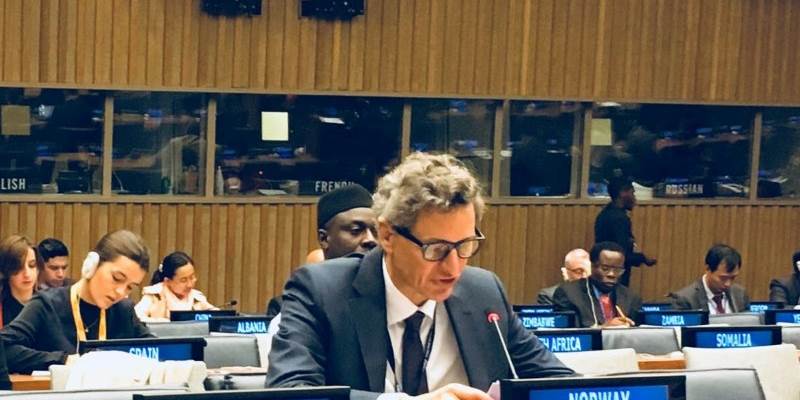Chair,
The peaceful elections in Liberia and the successful completion of the UN operation in Côte d’Ivoire this summer give grounds for optimism about the future of UN peace operations.
Unfortunately, developments in other countries are less positive – with conflicts that are worsening or have become entrenched, despite a long-standing UN presence.
Our task is clear: we must continue our efforts to make UN peace operations fit for purpose.
I would like to highlight six points:
First,
Every peace operation must be steered by a clear political strategy. UN Peace Operations must be guided by “the primacy of the political”, we often say.
But what does this mean in practice? It certainly requires unity between Security Council members and genuine political will by the host governments and parties to the conflict.
It also requires unity of purpose between the UN, regional and sub-regional organizations, and individual Member States.
Without consistent political and diplomatic support, the UN will not be able to succeed.
But changes are also needed in the way peace operations are planned, managed and supported.
In our view, the proposed changes to the organization at headquarters in New York are important steps in the right direction. In particular, we welcome the establishment of joint regional divisions, that can ensure joint analysis and strategic direction for missions.
We are also optimistic that the ongoing reviews of key missions, such as MONUSCO in the Democratic Republic of Congo and UNMISS in South Sudan, will lead to a more precise strategy for those missions.
Second,
The safety and security of peacekeepers is vital for effective implementation of the mandate, including as regards the protection of civilians.
The report on the special investigation of the violence in Juba in 2016 recommended that all missions should have rigorous contingency plans for crisis management. The increasingly complex and challenging environment in which peacekeepers are being deployed underlines the importance of such plans. These plans should be regularly updated and rehearsed.
Proper situational awareness is also crucial. Missions should be equipped with relevant technology and tools to increase operability and to better ensure the safety and security of UN personnel. Peacekeeping intelligence is one such tool.
Third,
Efforts to strengthen the capacity of peacekeepers to address conflict-related sexual violence must continue. Such violence jeopardises stabilisation efforts, undermines the fabric of society and marks its victims for life. To address the need for further practical guidance, Norway is collaborating with the UN in developing a UN handbook on conflict related sexual violence.
Fourth,
Norway welcomes the Secretary-General’s System-wide Strategy on Gender Parity, as a tool for strengthening operational effectiveness and productivity.
This clearly has to be a joint venture. For our part, Norway seeks to ensure a better gender balance in its armed forces and police service. From 2015 Norway introduced compulsory military service also for women. As a result, women today make up approximately 25 per cent of our conscripts and 11 per cent of our officers, which is a clear improvement.
We are proud that the Secretary-General has appointed Major General Kristin Lund as the first woman to head the UN’s military observers in the Middle East (in the UN Truce Supervision Organisation).
We hope this appointment will encourage other member states to nominate women to leadership positions in UN operations and in the Secretariat.
Fifth,
Efforts to strengthen the role of UN police must continue. The establishment of core functions and a minimum level of capacity within the criminal justice chain are key to successful completion of missions.
The increased prevalence of transnational organised crime and terrorism is making the task of strengthening local expertise even more demanding.
The specialised team concept, which Norway and the UN pioneered in Haiti, should be further developed as a tool for capacity building. The team concept makes it possible for member states to deploy groups of experts that can provide focussed support in areas that demand specialised competencies – such as sexual and gender based violence or serious and organized crime.
The Strategic Guidance Framework for International Police Peacekeeping should be finalised and rolled out as soon as possible. Norway will continue supporting the implementation of the framework, for example by financing the development of thematic manuals.
Sixth,
The relationship between the UN and regional organisations, particularly the African Union, should be further enhanced. Norway welcomes the Security Council’s commitment to taking effective steps in this direction, as expressed in its resolution of 20 September. We must find a way to make UN support for AU-led operations more predictable.
Norway supports the efforts to strengthen the broader partnership between the two organisations in various ways. One example is funding for the development by the two organisations of recommendations for joint planning and mandating processes for AU operations authorised by the Security Council.
Finally Chair,
Norway fully supports the Secretary-General’s vision and leadership to allow the United Nations to fulfil its potential.
We are pleased to note that one of the priorities of the proposed reform package is to render UN peace operations more effective.
We look forward to working with other member states from all regions in order to make this vision a reality.
Thank you.
